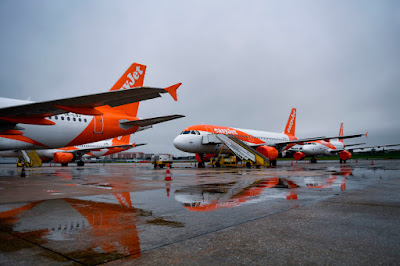Airlines trash middle-seat social distancing
As EU ministers try to figure out how to get the
industry going again, some airlines argue keeping seats free is a useless idea.
By SAIM
SAEED 4/28/20, 3:00 PM CET Updated 4/29/20, 7:08 AM CET
Passengers
might hate getting jammed into the middle seat on planes but leaving it empty
is not going to lower their risk of catching coronavirus, argues an industry
group of the Continent’s largest airlines.
That was
their message ahead of Wednesday’s virtual meeting of EU transport ministers on
how to restore travel amid the pandemic, which has grounded 90 percent of
Europe’s air traffic.
In a letter
to the ministers dated Monday, lobby group Airlines for Europe (A4E) said:
“Social distancing is neither necessary nor viable on board an aircraft.” Both
Lufthansa and easyJet have promised to keep some seats free as a temporary
measure while the industry gets back up and running.
But
Brussels’ major aviation lobby (which represents 16 airlines, including
Lufthansa and easyJet) argued it is impossible for flight crews to operate an
aircraft maintaining a 2-meter distance from passengers or each other, and that
there is no financially viable model for any airline that is forced to fly a
plane only two-thirds full.
Ryanair CEO
Michael O'Leary called the idea “idiotic” and said if his budget airline is
required to fly with the middle seat vacant, the carrier will either charge the
government for the seat or it won’t fly. “We can’t make money on 66 percent
load factors," he told the FT last week. “Even if you do that, the middle
seat doesn’t deliver any social distancing, so it’s kind of an idiotic idea
that doesn’t achieve anything anyway,” he said.
“There must
also be coherence when it comes to the operational measures that both airports
and airlines will need to comply with" — Jost Lammers, CEO of Munich
airport and president of ACI-Europe
That
doesn’t mean airlines have a clear idea as to how they will start making money
again.
As the rate
of infections decreases across Europe, governments are looking to reopen their
economies, but they have to temper that by ensuring the virus does not spread.
Those efforts largely center on keeping people physically distanced and
avoiding groups in confined spaces — something that’s impossible on a plane.
Policymakers,
regulators and the industry are busy coming up with a plan that could minimize
risk for travelers and crew as some air travel is slated to return. EU aviation
regulator EASA is drawing up safety guidelines for the industry, and in the
meantime airports are working on their own best practices that require changes
in disinfection routines, installing coronavirus testing facilities and
temperature checks, and reorganizing gates to ensure space between people.
On Monday,
Italy issued guidelines for air transport, including mandatory masks,
temperature checks for passengers and “one-way” corridors for arriving and
departing passengers at airports to prevent crowding.
Can’t stay
away
Lufthansa
is for now keeping the middle seat empty on all flights, but with 90 percent of
its fleet grounded and rock-bottom demand, that’s relatively easy to achieve.
A poll
commissioned by global airline lobby IATA found that 40 percent of respondents
are willing to wait up to six months before getting on a plane. About 60
percent said they could expect to be on a flight within the next two months.
Once demand
returns, a distancing policy will be hard to maintain. And budget airlines
including Ryanair need the plane to be full in order to be profitable.
Mandatory
social distancing on aircraft would be “the end of cheap air travel,” Alexandre
de Juniac, IATA's director general, said in a call with reporters last week.
“There is
no viable airline model with social distancing (of any kind) in place onboard
the aircraft,” A4E told POLITICO in an email.
Instead,
airlines want airports to take responsibility for spotting any health risks at
departure. “Public health safety should be approached like aviation security —
with passenger screening carried out on the ground in order to ensure safety on
board,” A4E said.
It suggests
screening procedures and facilities should be paid for by governments.
The sector
is also asking EU ministers to ensure that any changes are coordinated.
Brussels and the industry have warned national capitals that if restrictions
ease in the haphazard way they were imposed, it could take even longer for
airlines to start flying again.
"We
cannot afford to exit this crisis the way we got into it," Jost Lammers,
the CEO of Munich airport and president of airport lobby ACI-Europe, said in a
statement Tuesday.
“There must
also be coherence when it comes to the operational measures that both airports
and airlines will need to comply with. This is going to be essential if we want
these measures to be not only effective — but also to secure public
confidence,” Lammers said.


.jpg)







Sem comentários:
Enviar um comentário